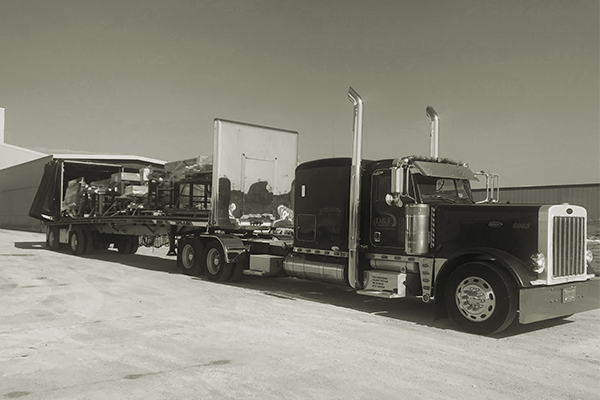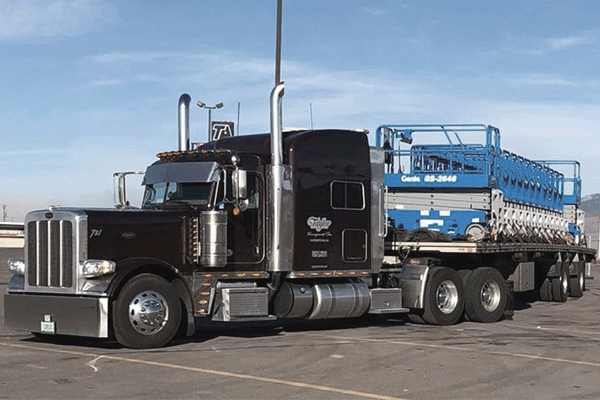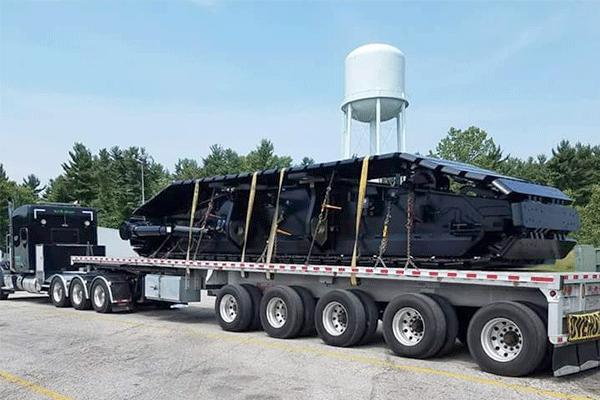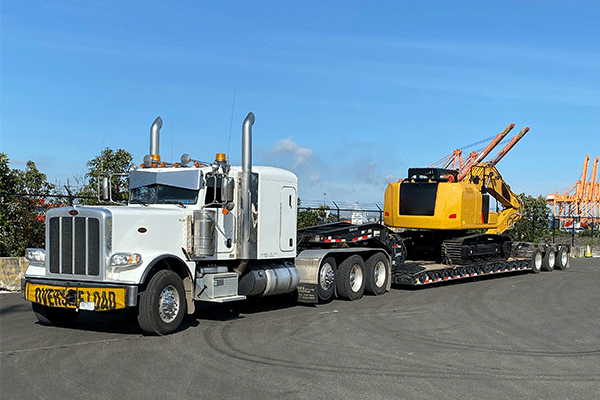The problem with first impressions is that unless you find yourself suddenly thrust into a real-life “Groundhog Day” scenario, you don’t get a second one. There are no do-overs. . . unless you’re Bill Murray.
Additionally, changing someone’s mind after a bad first impression can often prove harder than you bargained for.
This pattern holds true in the world of freight brokerage. With over 17,000 freight brokers battling at the feet of this nation’s shippers, many of the worst ones are granted an introduction.
These bad brokerages — those that don’t possess the skills, values or competencies to help their customers — leave shippers with a bad taste in their mouths and sour them toward future brokerage partnerships.
Beyond this, shippers who don’t initially find their right-fit brokerage can sometimes lump all brokers together — connected in their subconscious by a single bad impression.
Here at ATS Logistics, not only do we take pride in what we do but we’re also lucky enough to say that we’ve been helping shippers meet their deadlines and maximize their budgets since 1989 .
That said, we also recognize that not all freight brokers are created equal and many of them leave bad first impressions with their unreliability, poor work ethic, lack of ethical values and short-term mindsets.
These brokerages give all of us a bad name and make it difficult for shippers to trust competent ones.
This isn’t how good brokers operate and we’re here to tell you why.
Below, we’ll dispute and discuss some of the most common freight brokerage misconceptions including:
- Freight brokers are motivated to charge their customers more and carriers less
- Brokers don’t vet their carriers, they’ll work with whoever they can get
- Brokers can’t hold their carriers responsible
- It costs more to work with a brokerage than an asset carrier
- Brokers bid low on lanes to get business but can’t follow through
- Brokers respond slowly when things go wrong
- Brokers can’t provide load-tracking capabilities
- Brokers aren’t efficient at finding truck capacity
Although these misconceptions certainly apply to some of this nation’s many freight brokers, they aren’t universally applicable.
Let’s discuss why. . .

Myth #1: Freight brokers are motivated to charge their customers more and their carrier partners less
Freight brokers are third-party transportation service providers. As such, in order to stay in business and turn a profit, a freight brokerage must provide its service at the highest possible level.
Although it’s true that brokers keep the lights on by making a profit via net margin (the amount they’re paid - the amount they pay the carrier) on your freight, increasing their take-home by up charging their customer is never a good broker’s motivation.
More than anything else, a brokerage needs to get your freight moved. To do so, good brokerages price your freight “to execute” — based on exactly what it’ll take to get the job done.
A good broker will be able to explain, in detail, the rate that they’ve quoted you which should account for factors such as:
- Seasonality in your region
- Supply and demand in your area
- The urgency with which you need a solution
- The dimension/weight of your cargo
- Any specific needs of your freight (tarping, blanket wrap, etc.)
- The distance your freight needs to travel
- The commodity and insurance requirements
If for any reason you feel like your brokerage is up charging you to make more money on your load, ask them questions like:
- “How do you price my freight?”
- “Are there any alternative options for me?”
- “Are there any other ways for me to save on my shipments?”
The answers your broker gives to these questions should be clear and transparent and leave you feeling comfortable with your price. This is your freight and your money, a good brokerage — with a long-term, relationship-growth mindset — will always put your needs first.
Debunked:
Freight brokers aren’t motivated to charge you more and their carrier partners less, they work in a business of relationships and the better they are at maintaining them, the more money they’ll make. It’s as simple as that.
Myth #2: Brokers don’t vet their carriers; they’ll just take whoever they can get
This is a hugely damaging misconception. The transportation industry is, far and away, one of the most dangerous and important industries on the planet.
Think about it, with an average gross vehicle weight GVW of 80,000 pounds rocketing down the highway at 60-70 miles per hour, the safety concerns in this industry are astronomical. As such, un-reliable carriers who don’t make safety their top priority simply can’t be trusted with the responsibilities of this job.
For this reason, it’s important that freight brokerages only allow the most qualified, reliable and safe carriers to service their customer’s freight.
Although it may be true that some brokers — the worst of them — do nothing to ensure the best possible carrier is on their customer’s freight, this is certainly not the norm.
The firms that accept and broker loads to carriers boasting track records of unsafe practices and unreliability simply don’t succeed in this industry.
Many of the nation’s best freight brokerages not only vet their carriers initially but do so frequently and thoroughly. Automatically monitoring their carriers for safety ratings, reliability history and active authority give great brokers the information they need to make sure that their customers get the absolute best carrier available for their freight.
Debunked:
The right brokerage won’t just add any carrier to their network. Their partnerships, values and reputation are too valuable to them. Look for a brokerage with these qualities.
Myth #3: Brokers can’t hold their carrier partners accountable
Believe it or not, holding their carrier partners accountable for failure, unsafe practices and other damaging errors is actually pretty easy for good brokers.
You see, these brokerages are well respected in the transportation industry and have a wide variety of trusted, reliable carriers to choose from. For this reason, good brokerages aren’t pigeon-holed into using unreliable carriers as they’re simply able to move on to another.
In turn, this wide variety of reliable options makes it easier for freight brokers to hold their unreliable partners accountable as they make notes of each mishap and bad experience internally.
And, the next time these brokers are looking for a load in that unreliable carrier’s neighborhood, their prior experience allows them to exclude that carrier from competing for their customers’ freight.
As you may suspect, the bigger brokerages become a large part of their carrier’s supply chain and give them loads to service with frequency. Because of this, carriers in these relationships need to be reliable so that future business will come their way.
Debunked:
Great brokers hold carriers accountable by making note of their shortcomings — typically on internal systems — and withholding future business.
Myth #4: It costs more to work with a brokerage than to go directly to the carrier

This is an easy misconception to have because, at its most basic level, it makes sense.
Cut out the middle man so that you can save the cost of using them. Seems simple enough.
The thing is, when you use a good freight brokerage, the value they provide actually ends up saving you money on your shipping costs.
Using their visibility of the trucking market to find the best fit carrier in your area, various technologies to make your life easier and their trucking market expertise forged through the years, the value brokers provide can actually save you money.
By finding carriers that — based on past experience and thorough vetting — can get the job done for their customers, freight brokers save their customers the cost and hassle of sourcing for capacity on their own.
Couple in the fact that good freight brokers understand the intricacies of the trucking market such as the carriers looking for a backhaul and which areas of the country are “hot” at the moment, and a broker’s oversight can really pay off on their customer’s balance sheet.
Debunked:
Often, brokers are able to save their customers money by finding the right truck for their freight in the right location at the right time. This gets more difficult without their expertise and visibility if you were to go right to the carrier.
Myth #5: Brokers bid low on lanes to get the business but can’t cover their commitments
Some freight brokers — especially those that are just getting their start in this business — don’t have the ability, infrastructure or relationships to make money the right way.
These brokers typically don’t have many customers or the experience it takes to understand the intricacies of this industry.
In turn, the only bargaining chip on the table for these inexperienced brokers is money.
As such, bad brokerages undercut their competition by offering capacity at rates that, when the time comes to provide a truck, they can’t stand by.
Their inability to provide capacity at the originally quoted price leads these brokers to do one of two things:
- Return to their customer for more money
- Fail on the load entirely
Good freight brokers don’t have these same issues. Using their industry expertise, strong carrier network and the fact that they price loads, not at the lowest price but the right price, the best partners are able to reliably come through for their customers.
And, should it come down to it, the most financially stable brokers are willing and able to take a loss in favor of maintaining a steady relationship with their customers.
Debunked:
The freight brokerage you want to work with will always price their rates based on what it takes to get the job done and stick to it. Holding to their commitments is a huge part of who they are, they’ll get it done.
Myth #6: Brokers respond slowly when things go wrong

It’s trucking, things go wrong all the time. Trucks break down, truckers change their plans or sometimes run into bad weather. Truly, there are a ton of things that are out of human control in this industry.
The way that freight brokers respond to these issues, however, is a whole different story.
For brokerages that prioritize quality service and fully commit their resources to meet the needs of their customers, finding a solution to an unpredictable issue is their top priority.
Although it’s true that a brokerage can’t “force-dispatch” or frantically deploy a new truck, trailer or driver to your freight, the value of their partnership in these situations still holds firm.
Good brokerages always pick up the phone and find their customers a solution when things go awry, communicating ETAs and adjusted timelines for delivery. Sure, it may take them a beat to locate the best-fit solution to your problem, but you can rest assured that you will never be left hanging.
Debunked:
The right brokerage won’t respond slowly when things go wrong. They’ll be intimately beside you every step of the way as they use their expertise, visibility and technological tools to find you a solution.
Myth #7: Brokers can’t provide their customers visibility over their freight
In today’s digital world, there are plenty of tools available to provide load-tracking visibilities to a broker’s customers. From mobile applications to electronic logging device software, a lot of the best brokers offer these capabilities.
Unfortunately, there are also a lot of brokers that don’t. You see, purchasing load tracking software is an expensive investment — one that won’t be made by brokerages that don’t prioritize quality service.
Don’t get caught up utilizing these brokers, they won’t make the investment in you why would you make one in them? Instead, find a brokerage that offers their customers visibility in the form of load-tracking software and online customer portals.
Debunked:
Offering their customers visibility over their shipments has never been easier. Good brokerages prioritize transparent visibility with their customers as a rule and readily offer these capabilities.
Myth #8: Brokers aren’t efficient in finding truck capacity
 With over 700,000 trucking companies littering the expanse of the U.S., freight brokerages certainly have a lot of options to choose from. That said, in a business of relationships, not all brokers are good at maintaining them.
With over 700,000 trucking companies littering the expanse of the U.S., freight brokerages certainly have a lot of options to choose from. That said, in a business of relationships, not all brokers are good at maintaining them.
Carriers won’t enter into a partnership that they feel can’t serve their needs. As such, some of this nation’s shoddiest freight brokers simply don’t have a network large enough to find truck capacity quickly for their customers.
Where a good brokerage can locate their customer’s best-fit truck based on their needs and timelines, many cannot. If a brokerage doesn’t have a solid carrier base backing them up it can be difficult for them to find capacity for their customers.
This is where this misconception gets its start.
You see, many of this nation’s largest brokerages boast departments full of carrier reps dedicated to maintaining relationships with their trucking company partners.
Brokerages with this level of infrastructure are consistently looking to add great carriers to their network and expand their reach.
In turn, brokers with these larger networks are able to find capacity for their customers quite easily — provided they price their freight correctly and are given adequate lead time.
Debunked:
Good freight brokers understand their partnerships, capabilities and breadth of reach. As such, these brokers are able to find their customers the capacity they need when and where they need it.
The Right Broker Can Make a World of Difference
Now that you understand that these eight misconceptions about freight brokerage aren’t universally true and how the right brokerage can make a substantial impact on their customer’s supply chains, your next priority is to pick a good one.
Developing a deeper grasp on some of the things to look for when selecting a broker will help you do this.
Check out the video below where we take an in-depth look at what you should be looking for in your best-fit brokerage partner.
(insert video)
Here at ATS Logistics, we pride ourselves on separating ourselves from these misconceptions as we help our customers flourish. If you would like further information on how we can help your business, reach out! We’d love to help you meet your deadlines.





